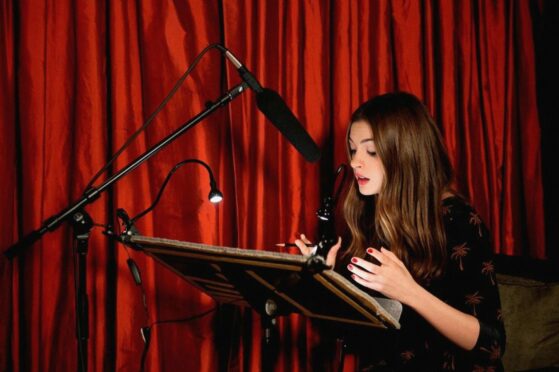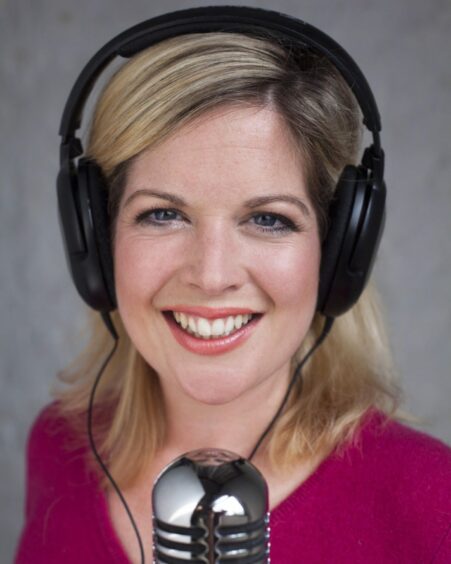
Eilidh Beaton is in high demand. The audiobook storyteller, who has narrated more than 150 books from psychological thrillers to classic children’s tales, is booked for months as our huge enthusiasm to be told a story continues long after childhood.
The UK audiobook market reached £200 million in 2021 and according to Spotify the audio share of the global book market is growing 20% year on year. This has led to the music streaming giant launching a new audiobook service, adding 300,000 titles. Meanwhile, Amazon’s Audible service announced that JK Rowling’s Harry Potter books have been listened to more than one billion times.
According to publicists, the nation’s love of audiobooks snowballed during the pandemic when people took comfort in listening to reassuring voices telling compelling stories amid the challenges of self-isolation. People also found themselves with more time for reading or multi-tasking during lockdown.
For Beaton, the love of sitting down and being told a good story is a timeless pleasure, and that’s why people enjoy listening to books so much.
“Who doesn’t love being told a story? I would say that for a lot of people listening to a story is more accessible than sitting down and reading,” she said.
“Both, of course, are wonderful but anything that means that people can enjoy more content, written by fantastic authors, the better, as far as I’m concerned. Life is so busy that it’s not always possible to read as much as we would like and audiobooks cut through that issue.
“I listen to books when I’m driving, cooking, cleaning, walking my dog, on the train. Also, it’s brilliant how much difference it makes to how enjoyable a story can be. But listening to audiobooks doesn’t just have to be about making boring things more fun, it’s also just about settling down with a good story.”
Beaton, who had planned to become a stage actor and whose family hailed from the Isle of Skye and Inverness-shire, now lives in London, and narrating in her parents’ accent remains one of her favourite aspects of her job.
“I love Scottish accents and was always incredibly disappointed that I developed a southern accent, growing up in Kent,” she laughed. “My dad was from Skye, one of six, and my mum is from Inverness-shire, one of four, and with more than 20 cousins that’s a lot of blethering. My wider family members were equally determined to keep up my Scottishness with Oor Wullie and The Broons annuals for Christmas and deliveries of Runrig albums, Fair Isle jumpers and kilts.
“My family is quite spread out around Scotland so throughout my life I’ve spent holidays going to Skye (my favourite place in the world and where my wonderful dad is buried), Fort Augustus, Inverness, Pitlochry, Edinburgh and Glasgow.
“This means that it’s just as comfortable for me to chat with any of these accents as it is my fairly nondescript RP (Received Pronunciation).
“I would say, more than anything, I have narrated in Received Pronounciation with the main characters moving to various parts of Scotland.
“I love accents though, so if I’m comfortable that they are authentic, I’m happy to voice characters from lots of places. In one of the cosy mystery series I narrate for author Clare Chase, the main character has a soft US accent but the main narration is RP.
“I genuinely love every book I narrate because I put my heart and soul into each one, knowing how important it is for the author who has painstakingly created their world, that their work is done justice.
“I love it when I narrate several books for an author because I really get to know their style, which makes it super enjoyable for me and hopefully creates a nice synergy.”
Among her favourite authors to work with is Ayrshire-born, best-selling romantic fiction writer Jenny Colgan: “She has an uncanny ability to make a reader laugh and cry on the same page and there’s a lot of joy in her work.”
According to Jan Rutherford, a freelance publicist and publicity and marketing director at Edinburgh-based publishers Birlinn, the voice of the reader is a huge part of what draws a listener into a story, so it seems natural that the celebrity narration trend is surging in popularity.
World-famous narrators range from Hollywood actress Reese Witherspoon reading Harper Lee’s classic To Kill A Mockingbird, to Anne Hathaway, the star of blockbusters including The Devil Wears Prada, The Dark Knight Rises, Les Miserables and Interstellar, voicing L Frank Baum’s The Wonderful Wizard of Oz on Audible. And when Stephen Fry’s famous narration of the all-conquering Harry Potter series first launched on the platform back in 2015, it sold roughly 345 audio copies per hour.
“The voice of the reader is hugely important when considering publishing a book in audio format. The voice has to suit the content of the book. If you get that wrong, it can be a really poor experience for the listener,” said Rutherford.
“Although celebrity narration is a real draw for people to listen to certain audiobooks, there also needs to be a balance in finding the right person for the book – someone who is able to have that range and tell the story well, which most actors of course should as they’re used to becoming different characters.”
Bedtime storytelling is another booming trend. When superstar singer Harry Styles’ sleep story, Dream With Me, was released in July last year, the Calm app crashed due to demand. The likes of Magic Mike actor Matthew McConaughey and singer Kelly Rowland are among the other big names who have narrated bedtime tales.
As listening options expand, could the number of stories we read on the printed page, rather than listen to on headphones, decline? Not according to Philip Stone of Neilsen Book Data, who says the audiobook market’s success mirrors the rise in book sales in recent years. “Physical book sales in the UK in 2022 stand at 170 million copies sold, up 12% versus pre-pandemic levels from 2019, and at £1.44bn in value terms, up 11%,” he said.
“Therefore, I’d suggest that the recent growth in sales of audiobooks doesn’t appear to be negatively impacting sales of physical books.”
Sue Palmer, Edinburgh-based literary expert and child development author, also believes that audiobooks act as a great accompaniment to physical books and can aid literacy, especially for children learning to read.
“Children love listening to stories, and listening to books read aloud familiarises them with the patterns of written language,” she said.
“Hearing stories read well is second only to reading them for yourself in terms of cognitive development. You’re processing language and the story is playing out in your head. It’s a different sort of satisfaction from watching a film or TV programme.
“In terms of the digital age, I think IT will make it ever more difficult to teach literacy skills. We simply don’t need them as much as we did in the past. And IT is definitely affecting everyone’s attention span so it’s more difficult to help children acquire basic decoding skills.
“But I think lots of listening to stories can help here. It tunes children into language, and the patterns of written language. And it develops their thirst for stories, which is probably the best way to motivate them to want to read for themselves.”
The best of 2022
- Project Hail Mary, written by Andy Weir and narrated by Ray Porter
- A Promised Land, written and narrated by Barack Obama
- The Storyteller: Tales Of Life And Music, written and narrated by Dave Grohl
- The Sweetness Of Water, written by Nathan Harris and narrated by William DeMeritt
- All The Lonely People, written by Mike Gayle and narrated by Ben Onwukwe
The Audie Awards

Enjoy the convenience of having The Sunday Post delivered as a digital ePaper straight to your smartphone, tablet or computer.
Subscribe for only £5.49 a month and enjoy all the benefits of the printed paper as a digital replica.
Subscribe